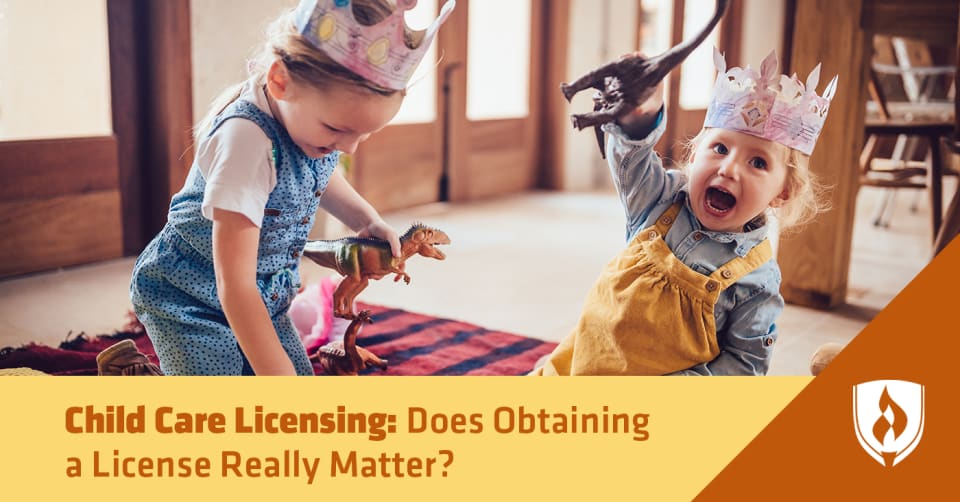
Your days as a stay-at-home mom are hectic, but you wouldn’t trade them for the world. You love spending life’s ordinary moments watching your children learn and grow---but you’d also like to be able to contribute to your family’s income.
An in-home daycare could give you the best of both worlds. You’ll be able to have a flexible schedule as a business owner, continue staying home with your own kids and earn some extra money helping care for others’ little ones.
It sounds picture perfect, but opening an in-home child care center can be daunting. There’s the business side of finding customers and the technical side of meeting regulations. Then there’s the additional question of licensing. Is the hassle of child care licensing really worth it or can you safely set up shop without a license in hand?
We did the research and gathered expert opinions to bring you the scoop behind child care licensing.
Do I really need a child care license?
The simple answer: maybe.
Whether or not you need a license depends on where you live and how you plan to run your daycare business. Child care licensing requirements vary by state---and to make things even more complicated, each county and city within your state may have other specific licensing regulations!
Technically speaking, you don’t need a child care license to run a small daycare business out of your own home. But as soon as you decide to hire employees, accept more children into your daycare or expand to a location other than your place of residence, you’ll probably need that child care license. Find out more about your state’s licensing requirements in this list from the U.S. Office of Child Care.
What are the benefits of having a child care licensed?
You may not need a license to open your daycare, but there are plenty of perks that come with being licensed. These are just some of the reasons you might want to consider obtaining your child care license.
1. You can earn more money
Most states limit the number of children you can care for (aside from your own or those of a relative) at any given time without a license. For example, California allows you to care for children from just one other family without a license, and New Hampshire limits you to three children other than your own.
These restrictions on the number and ages of children you’re allowed to accept without a license can considerably lower your earning potential. Being licensed may also attract more parents to your daycare program since licensing reassures them that their kids will be in good hands. Just imagine that framed license hanging on a wall for parents to see when they drop their kids off--it adds an invaluable layer of credibility to your business.
2. You’ll have room to expand
There may come a time when you’d like to expand your daycare business to a location other than your home, and you’ll need a license to do it.
“You may be thinking you'll run a small, in-home child care operation right now,” says Scott Wayman, CEO of childcare management platform Kangarootime. “It’s not uncommon though that an in-home center can grow over time to become a larger, multi-class childcare center.”
He recommends building early relationships with licensing officials and understanding the nature and purpose of licensing requirements. This will put you in a better positions for future growth.
3. You’ll provide better care
Licensing isn’t just about filling out paperwork and jumping through hoops. You need to complete important training and certifications in order to qualify for licensing – and much of this training will equip you to provide better care for your youngsters.
Not only does licensing ensure that you have up-to-date training on child safety, it can also prevent accidents by making sure your home environment is free of hazards and meets child safety standards. Your training will also ensure that you have all of the latest information on city and state regulations, which can help you avoid trouble down the road.
4. You’ll have access to government programs for child care providers
Running an in-home daycare can be an expensive ordeal. Between providing meals, buying toys and replenishing craft supplies, your profits as a daycare owner can dwindle. There are government programs to help you lighten the load and keep more of your hard-earned money in your pocket, but you need to be licensed to qualify for them.
For example, the Child and Adult Care Food Program (CACFP) typically reimburses licensed home daycares for two meals and one snack per day per child. Local Child Care Resource and Referral (CCR&R) agencies also offer services, programs and grants that are only available to licensed providers. These little perks can add up to big benefits for those who take the time to acquire a child care license.
How do you become a licensed child care provider?
Now that you know the benefits of becoming licensed, you’re probably wondering how the child care licensing process actually works. Since every state is different, your first step is to get in touch with your state’s child care administration office. They’ll give you the information you need to begin the application process. If you could do your business a big favor by licensing, it’s worth investigating. It might be more painless than you expect.
In addition to filling out basic paperwork and undergoing a criminal background check, you’ll also have to meet your state’s requirements for training and certification. This will most likely include classes like CPR, first aid and emergency procedures. Some states may also require you to have a certain number of hours of experience working in a child care facility.
It’s important to keep accurate documentation of everything you do while going through the application process. This will help you complete your application properly and serve as a backup in case any information gets lost in translation. You’ll also need to keep accurate records to maintain your license once you earn it.
This may sound daunting, but it doesn’t have to be. “Using a childcare management platform that automates all record keeping and center operations, including all mandated licensing reporting, frees up your time to focus on the children in your care,” Wayman suggests.
Is child care licensing right for you?
You’re the only one who can decide if child care licensing is the right step for your in-home daycare. Whether you choose to become licensed or not, you need a solid plan to make your daycare business a success.
Check out our Step-by-Step Guide to Opening a Daycare so you can get your business off on the right foot from day one!
RELATED ARTICLES:




